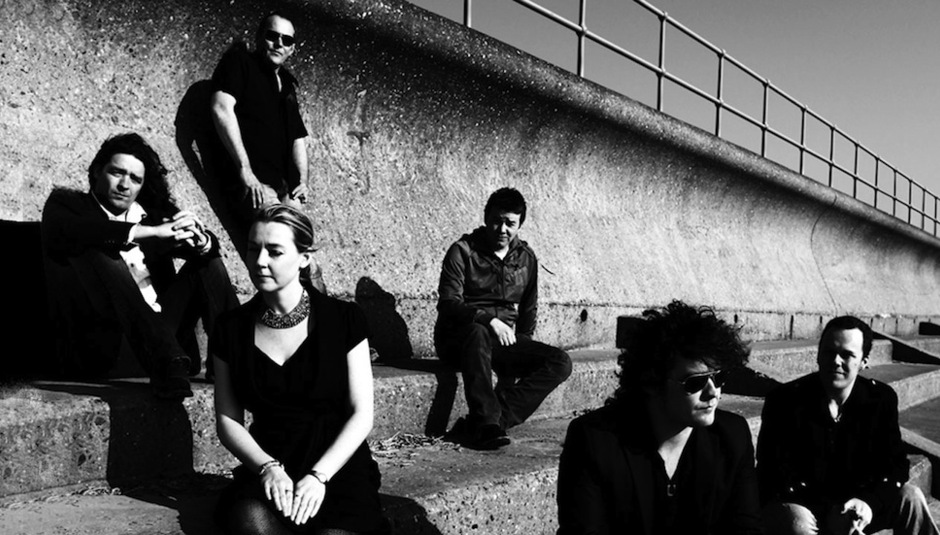Whilst they have never been flavour of the month for the mainstream music press, and despite the fact that they are often labelled as being part of the most uncool genre around (prog rock), Anathema are more popular than ever. Their last three records – 2010’s We’re Here Because We’re Here, 2012’s Weather Systems and last year’s Distant Satellites – have seen them rise to the very tip of the underground.
The band has always been a family affair at heart, and never more so than with the current line-up. Lead vocalist and rhythm guitarist Vincent Cavanagh, alongside his elder brother Danny on lead guitar and backing vocals, have been ever-present. Drummer and keyboardist John Douglas has only missed one album. His sister Lee joined the band as a second vocalist around 2003. Vincent’s twin brother Jamie was the band’s original bassist, and returned in 2001. The only current member of the band who is not a member of the Cavanagh or Douglas families is Portuguese keyboardist and drummer Daniel Cardoso (who previously worked with Kristoffer Rygg of Ulver in Head Control System).
Certainly, Anathema have come a long way since their foundation in 1990. Having dumped their original name (Pagan Angel), Anathema swiftly became one of the ‘Peaceville Three’, a trio of influential UK death-doom metal bands – completed by My Dying Bride and Paradise Lost – all signed to Peaceville Records in the early 1990s. Although elements of this sound remained a crucial part of the band’s identity throughout the 1990s, as the years went by the band showed an increasing affinity with art rock luminaries from Pink Floyd to Radiohead. Today they blend their more experimental interests with an uncanny knack for producing emotionally powerful, searingly melodic rock music.
In recognition of the band’s quarter-century existence, the band are embarking on the ‘Resonance’ tour, in which they will play material from every one of the band’s records to date. In light of this, DiS spoke to Vincent Cavanagh to get his take on Anathema’s history…
DiS: To kick things off, how are you feeling about the upcoming Resonance shows and why have you decided now is the right time to do them?
VC: It's just the right time to do it I think. I was probably the last person in the band who was convinced to do such a thing. I tend to always look forwards to the next record rather than back to the others... but ever since it was all set up I've been really looking forward to it. The best thing I think, for me, will be getting to play with Duncan [Patterson, former bassist] and Darren [White, former vocalist] again. We used to have such fun on the road, back in the days when Darren was in the band because we were just kids. We were barely old enough to drink in pubs so it was a blast going straight out of school onto a record deal and on tour. Certainly in my family we'd never travelled before. The furthest I'd been outside of Liverpool was going to North Wales! All of a sudden there we were on tour off to Brazil or Romania. We were going off to tour in Europe as headliners in a couple of other bands.
DiS: How do you feel looking over the back catalogue now?
VC: I think there's a marked change between the sounds of each of the albums. When I look back now that's definitely something I can recognise. There's been a gradual progression. Lots of people seem to think there has been two distinct phases in Anathema's history: the old sound and the new sound, which I think is bollocks and complete laziness. People can make up their own minds but, certainly, to me there is a natural progression to it. That's why we're still very close to our early music. That's why we spent a fortune doing Falling Deeper with an entire orchestra, etc. We're extremely proud of what we did back then. We didn't change our sound because we didn't like it at all. So doing this tour is one way for us to say to people that we're still in to everything we've done... and it's worth making the point that we're still very close to Darren and Duncan as well.
The other thing I’d say in response to that is that even in the beginning we did have an ear for experimentation. We did a twenty-three minute synth piece. We did some stuff in reverse. We had psychedelic sections and spoken word sections, classical sections, female vocals, acoustic sections, etc. This was all around the time of the first EP and album that we did. I think we always knew that the experimental side of things would come more to the fore as time went on, and that we would end up bringing different things to the table as we matured.
DiS: The moment that I’d maybe say was a genuine landmark moment in the Anathema discography was when you took over vocals after Darren left…
VC: I think there are two actually. Yes, there's when I took over the vocals from Darren, between the first and second albums. Then there’s when we tuned back up to standard pitch – which we did between Eternity and Alternative 4 - which was especially important for my voice actually, because it fitted my natural range better. That, in turn, led to us stripping a lot of the extraneous elements away. We were very sparing about what went on. That was partially influenced by Roger Waters's style on The Wall and some of his solo stuff, which Duncan was particularly into... and also a realisation that if you are writing confessional music then why embellish it and decorate it?
DiS: How did you initially feel about becoming the band’s vocalist?
VC: I didn't really want to be a singer at the time... or rather I didn't really know I could sing. I definitely didn't want to be a frontman. I was happy to be the side guy playing rhythm guitar. All of a sudden we were in the studio and we needed to finish off the album. I really just accepted my bandmates' confidence in me and did what suited what we had at the time. It took a few years to get comfortable with it. I think I placed too much emphasis on this idea of the frontman as having a responsibility and role to play as an entertainer, which isn't something I feel I'm naturally suited for. It was only when I learned to focus on delivering the lyrics with some integrity and upon the song that I learned how to be comfortable with it really.
DiS: I guess when Duncan left in 1998 that must have also been a big moment, because he had been writing a lot of the material on Eternity and Alternative 4 I believe…
VC: Yeah, Duncan had sort of taken over from Danny as the main songwriter at that point. We had so much going on in our personal lives at that time - it just wasn't to be unfortunately. Danny and I were coping with the death of our mother and previous to that it was pretty chaotic too so I think Duncan felt it was best to graciously step aside and let us pick up the pieces and do what we needed to do. I think he needed that too because he had his own things to go and do. He's a leader really. He works well on his own so that was probably best for all of us. Everything was secondary for Danny and I at the time. Neither of us was even sure if we wanted to continue at all to be honest.
We had to bring back John at that point. He'd been out of the band for a little while, basically because he was just taking far too many chemicals around ’97, so we had Shaun [Steele] come in for an album. However, when we decided to continue the band after Duncan had left we knew that we needed to bring John back for the sake of the spirit of the band. We needed to repair and become brothers again. We all feel like one big family in this band - that's important. I've known John since I was eleven years old. He's been my best mate that long.
DiS: That close connection between you all is clearly important to the band. I remember a few years ago you were telling me about how Lee joined the band, which is a great story…
VC: It definitely does feel like it's all meant to be in some ways, yeah. Lee had been singing in various other bands for years but we didn't really hear any of it cause we were off doing our own thing. Then one day Danny was staying at John's and in the morning he heard her singing making piece of toast or something and was pretty blown away! Going even further back. When we were ten years old or so we had interviews for grammar schools in Liverpool and, at the end of the day my parents had to choose where to send us because there were only two places at the grammar school, so the three of us couldn't all go together. In the end they decided to keep the twins - Jamie and I - together, which is logical, with only Danny going to the grammar. In the first day, the first lesson, I'm sat alphabetically next to John Douglas. I remember that day really clearly. His family were great. We hit it off straight away, and were listening to music too, so he became my best mate straight away. If I'd gone to school with Danny then we wouldn't be having this conversation because that friendship between me and John is what started it all off.
DiS: That really emphasizes the importance of John returning. I think Judgement is important in the discography as a whole too isn’t it? It’s certainly a fan favourite…
VC: Yeah, I think the other reason Judgement stands out is because it was a big statement for us to come back from the loss of Duncan, who had been such a big part of the songwriting on the previous two albums. We came up with a lot of stuff just from playing together and it really did feel like a band again. I think that really helped us rediscover our immense passion for creating music, which, along with the bond we have between us because we have known each other so long, is what has held us together all this time I think. That’s where the music comes from really. I can’t emphasise enough that we don't tolerate each other still because we have a career together! I think it's a testament to all of us as people - our resilience as a family and as people - that we can have stuck together through all the turmoil this band has had.
DiS: That was when Jamie rejoined the band on bass too right?
VC: It was after A Fine Day to Exit. Dave [Pybus, ex-bassist] left to join Cradle of Filth and then Jamie came in. Les [Smith, ex-keyboardist] joined around that time too. He'd played with us a bit before, and he'd been in Ship of Fools - who were this fantastic psychedelic band - and he had a lot of experience in the industry too which was really calming and helpful for us. He became our de facto manager really for the next ten years or so. It just seemed right to bring Jamie in. It felt right to get the family together and have him come back into the band. It's been fairly steady since then really, except now we have extra versatility in Cardoso, who switches with John between drums and synths.
DiS: Didn’t Danny left briefly between A Fine Day to Exit and A Natural Disaster?
VC: It's funny about that actually... I'd totally forgotten about it until the other day. I’m not exactly sure what happened to be honest. Maybe he did leave for a bit. It didn't feel like he was away for very long. If anything it was just down to a lack of communication and connection at that point. We're all guilty of losing touch with the people we care about sometimes in our lives. Danny and I weren't very close at that time, but when he came back he realised that Anathema was his home and he had all this music to get off his chest. He wrote all of A Natural Disaster. There's some quite "out there" stuff on that record, some really ambitious pieces like 'Closer' and 'Violence'.
DiS: Then there was a huge gap of seven years before We’re Here Because We’re Here arrived…
VC: After that I don't really know what happened in all honesty. During all of that time we were all writing a lot and there was a lot of stuff that got shelved. We still had one more record left on Music for Nations but when the Sony BMG merger happened they basically closed down all the small labels, which was very sad for everyone at the offices there because they basically all got sacked from doing something they loved. It was a bit of a liberation though, I have to admit, so we continued to tour and write. John had a bad injury. That took a while. We were still touring more successfully, and playing to more people, than ever before, which was weird because we weren't releasing anything! So around 2004-2010 there's loads of material that might possibly see the light of day, even if it doesn't how with what we're writing right now, even if it's just as good. I remember thinking it was an insane wait at the time.
DiS: But when that record did come out it was the biggest record you’d released to date, and the band has only become more successful since then…
VC: More importantly, for me, it was the first time since the first record that I was 100% happy with an Anathema album. I had my issues with all of them but I couldn't really fault We're Here Because We're Here, maybe because we took our time doing it. I don't really care what people say about things after you reach that point where you're content with it and feel like the job's done and you can't pick at it. There's no such thing as a holy grail in music but that feeling of contentedness is as close as you can get.
Anathema bring ‘Resonance’ to London’s Shepherds Bush Empire on 16th April. The band are also playing a selection of semi-acoustic cathedral shows, starting on Wednesday in Leeds:
4th March - Leeds Minster
5th March - Exeter Cathedral
7th March - Liverpool Cathedral
The reactivated Music for Nations is also reissuing some classic mid-period Anathema records in April. The albums Judgement, A Fine Day to Exit and A Natural Disaster have all been remastered for new vinyl editions. A special 3CD + DVD compilation covering the band’s MFN years – titled A Fine Day – will also be released.























